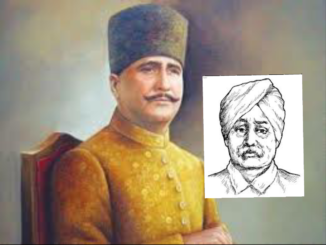
Iqbal and the creative use of philosophy
by, Meraj Rana
The tradition of reading and understanding Iqbal’s poetry from a particular point of view has been common since his time which is not erroneous in the sense that a coherent system of thought is certainly the source of creation.
But if it is admitted that the eminence of Iqbal’s poetry lies in the fact that it extends to a particular school of thought, then some questions arise here unwillingly. For example:
Is it necessary to have a system of thought in poetry?
Or the question of which part of the system of thought, life and the universe is related on the basis of which a poem can reach its altruism.
There is no doubt that poetry has a relationship with philosophy, but this relationship cannot be deepened until philosophy becomes connected to objects and reveals on the level of imagination.
This level of revelation in poetry would be so clear that it would seem plausible to assume human experience, observation or emotion. After Ghalib, Iqbal is the only great Urdu poet whose poetry is revealing. The scope of his disclosure is so wide that philosophy, in all its transcendental destinations, harmonises with the spirit:
عشق کی ایک جَست طے کر دیا قصہ تمام
اس زمین و آسماں کو بے کَراں سمجھا تھا میں
تیرے بھی صنم خانے میرے بھی صنم خانے
دونوں کے صنم خاکی دونوں کے صنم فانی
حیات کیا ہے خیال و نظر کی مجذوبی
خودی کی موت ہے اندیشہ ہائے گونا گُوں
خِیرہ نہ کر سکا مجھے جلوۂِ دانشِ فرنگ
سرمہ ہے میری آنکھ کا خاکِ مدینہ و نجف
All these couplets of Iqbal are based on their philosophical foundations. The philosophies with which Iqbal had a natural affinity. That is why here philosophy, in euphony with the spirit, discovers the level of divulgence where the new thought turns into the new phrase.
The first couplet is an astound mysticism of the reality that emerges as a result of the skirmish between the intellect and the heart. One of the most important human attributes is intellect, but its power cannot exceed its limits unless it includes the heart, that is, the intensity of love.
When the intellect becomes attuned to love, then the reality does not remain the reality, which seems to be specific to the emptiness of heaven and earth. The defeat of love over the intellect becomes the cause of seeing the hidden world within man.
Reaching this stage, man becomes acquainted with the realities that transcend the ignorance of heaven and earth.
In the second couplet, the point of the ephemerality of the temple (sanam khana) is of fundamental importance. Sanam khana is a metaphor for the world. Because sanam khana is related to worship. Therefore, this fact has been made clear to those who worship the world and worldly opulence. The reality of which is no more than a bubble.
This means that the world, which is purely material in its nature, will one day perish. So what is the use of worshiping such sanam khana which do not have permanence. Sustainability is achieved by the things that are driven by the spirit of love.
Material or telluric things can be a source of corporeal solace, but they are not able to provide the means of spiritual contentment.
In the third couplet, the question of endurance and resurrection is presented as an answer by establishing the question of life and self.
According to the poet, the absorption of thoughts and ideas into something is life. Thought is related to mind and heart and vision is related to manifestations of nature. There is an endless series of beautiful things in the manifestations of nature, from the beauty of the universe to the beauty of the woman, which is a sight for the eyes.
But these things do not become the means of the manifestation of life until they are absorbed in the eye. The absorption of sight in an object is the absorption of thought which in the form of the self proves to be the gnosis of life.
This means that the absorption of sight in the object is the manifestation of life and its distraction is the death of the self. Therefore, a person or a lover (ashiq) should immerse themself in a single object or idea with the intention of finding his true purpose and desire.
The fourth couplet is based on the comparison between the West and the East which proves the superiority to the eastern sciences over the western sciences. Here sagacity is a metaphor for western philosophy based on reason and logic. While Madinah and Najaf are not only holy places of the East but also symbols of love and knowledge.
That is why the poet, in spite of being in harmony with all the intellectual manifestations of the West and the East, does not reach the place where his eyes are dazzled.
That is to say, the western sciences, in spite of all their allurements, are unable to dazzle the eye of the poet, because it contains the intellectual light of Madinah and Najaf.
There is also the sentiment in poetry that a nation, influenced by the outward splendour of western or colonial thought and philosophy, can never immerse itself in a religion that is deeply rooted in its religious, scientific and cultural values and whose spiritual region is inhabited by Madinat al- Ilm (city of knowledge).
These couplets are not important in the sense that they are based on philosophy, but their greatness lies in the embodiment of thought which is in harmony with the combinations of earth and sky, Medina, Najaf and sanam khana, etc. They have become the means of the emergence of a metaphorical system where philosophy has become a substitute for feeling.
Therefore, it is not difficult to identify the values that make philosophy poetry. It should not be forgotten that Iqbal is first a poet and then a philosopher. Therefore, his poetry deserves to be read first with reference to artistic values and then with another reference.
At the creative level, no philosophy or ideology is considered valuable unless it becomes part of the conscience. Pure imitation of philosophy is one thing and its creative use is another. Iqbal has a creative use of philosophy. Therefore, his poetry holds a high position in art.
If one takes a closer look at the philosophical system of Iqbal’s poetry, it is not difficult to come to the position that the same set of philosophies which have the power of movement have influenced him in one way or another. Whether it is Maulana Rumi’s Masnavi or Mujaddid al-Fathani’s Witness Philosophy,(wahdattush shahood), Nietzsche’s supernatural philosophy or Bergson’s conception of time, they all have a common denominator.
If Iqbal’s passion was only for philosophy, then he would have pointed out the philosophers whose philosophies have a quintessential temperament.
Concerning philosophy, from the time of Thales to the present day, it has been a matter of judgement that it is arguably the study of the world of beings, the level of which can be both objective and subjective. Because philosophy begins with inquiry, and ends with the discovery of truth, that is why the German philosopher Stumpft calls it the question of science.
In Iqbal’s poetry, this interrogative knowledge is present everywhere, which is seen in the form of a tradition itself, regardless of the philosophical tradition of the West and the East and which is not based on reason and logic, but on conscience and revelation.




